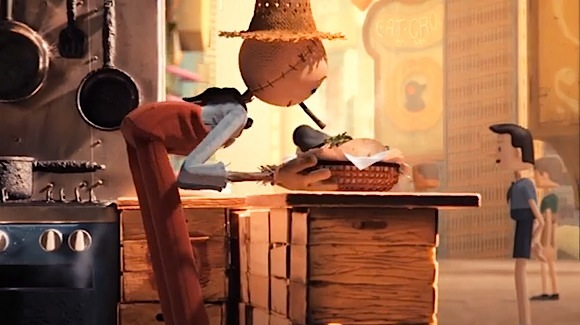
In the classic film, The Wizard of Oz, a motley crew of a tin man, a cowardly lion and a scarecrow join forces with a girl from Kansas for an adventure that reminds us that, at least in the movies, “there’s no place like home.”
Judy Garland and the cast from the 1939 film are only vaguely familiar to most of us in the 21st century. Yet its cinematic storytelling roots live in the best storytelling efforts of modern marketers. Today, they’re becoming digital storytellers. The best example is fast food marketer Chipotle’s viral video story made in collaboration with Moonbot Studios, “The Scarecrow.”
If Dorothy knew there’s no place like home, Chipotle’s scarecrow just wants us to know there’s nothing like homegrown (or natural) ingredients in our fast food dining. It’s a story worth seeing to understand. Please go ahead and watch it, I’ll be here waiting for you.
While Chipotle’s Scarecrow is quite visually stunning and features a soundtrack with Fiona Apple, the real contribution of this great three-minute video vignette is the authenticity of its story, which comes directly from the “why” of Chipotle itself and its founder, Steve Ells.
On the Chipotle website, Ells shares that story in video and text, writing that “As Chipotle began to grow and expand, I learned quite a bit about the way most of the food in the U.S. is produced and processed — and what I learned was pretty grim. Pigs are raised in stark confinement, produce is grown on vast factory farms with little or no regard for the environment, and dairy cows are confined and injected with hormones that can make them ill in an effort to increase their milk production.” All of this is directly reflected in the film.
Ells also writes that Chipotle’s bold claim to act differently comes from that very personal experience: “I also learned that there is a better way. I met ranchers and farmers dedicated to raising livestock and growing produce using responsible, respectful, and sustainable techniques. By partnering with these producers we have increased the amount of naturally raised meats and responsibly grown produce we purchase exponentially.”
A search of Google or any one of the major social media platforms will demonstrate that the Chipotle message has gotten out there, yet in today’s hyper-inflated marketing environment, plenty of skeptics question the company’s commitment. Skeptics want to know if this is just a marketing claim or an authentic belief of the company.
It’s in that context that Scarecrow becomes most remarkable. Sure, the video is beautiful. It’s long at 3 minutes, and it tells a complete story. And in a marketer’s dream, it links to a free game, available for Apple and Android devices in the appropriate online app stores, that keeps the conversation going with consumers.
 What’s most remarkable about the Chipotle story though is its commitment to the core company story about factory farming and its impact on us as casual diners looking for a quick meal away from home. The grim visuals of life for animals inside the factory farms depicted in the animated short are stark if not heart wrenching. They are also a bold challenge to Chipotle competitors. And, they are a very high bar by which Chipotle itself will now be judged.
What’s most remarkable about the Chipotle story though is its commitment to the core company story about factory farming and its impact on us as casual diners looking for a quick meal away from home. The grim visuals of life for animals inside the factory farms depicted in the animated short are stark if not heart wrenching. They are also a bold challenge to Chipotle competitors. And, they are a very high bar by which Chipotle itself will now be judged.
In a little more than a month since it was posted, the video’s already had more than 7 million views. While Chipotle really hasn’t discussed the budget for the film, it’s clear this is an investment that’s caught the attention of the public. Now the company will be measured by the picture it’s painted and the story it’s shared.
At WordWrite, our work with clients has taught us that successful stories in marketing require three elements: authenticity, or a story rooted in fact; fluent storytellers and a commitment to continually read the audience and ensure that they’re engaged and that real communication is happening.
Steve Ells and the Chipotle formation story are certainly real. Ells himself is a fluent storyteller and the digital scarecrow (and the villainous crow) of the animated film take the storytelling to a different dimension. The Scarecrow game creates the opportunity for an ongoing conversation that may well drive sales for Chipotle – and discussion about the food we eat.
The real measure of the Scarecrow will come now, in how Chipotle lives its story in the real world that we inhabit. Talking the talk is great; Chipotle must now demonstrate its unwavering commitment to walking the walk.
